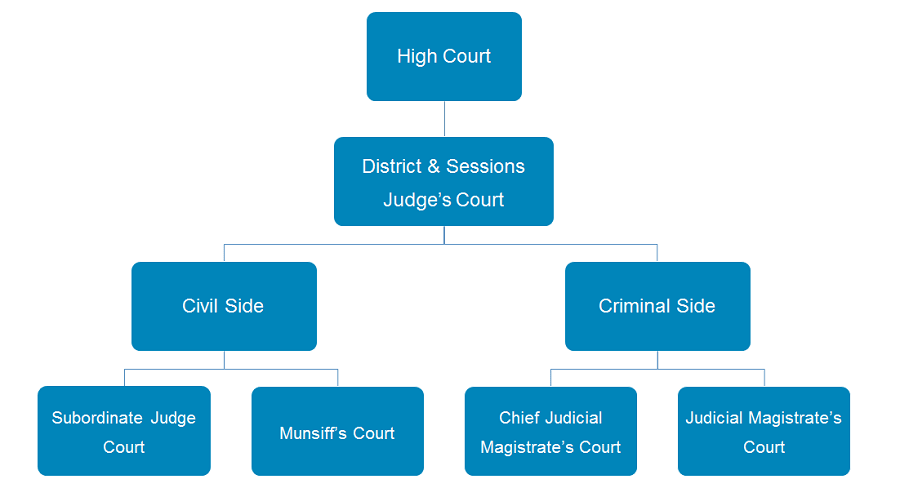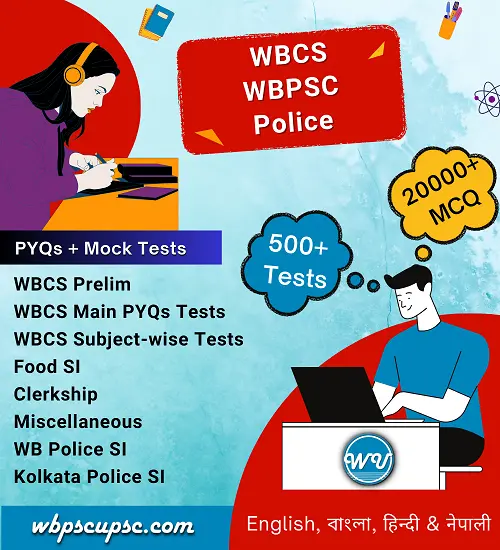March 3, 2020
Subordinate Courts – District Court – NLSA – Lok Adalat
Contents
- Articles 233 to 237 in Part VI
- The subordinate courts are function below and under high court at district and lower levels.
Appointment of District Judges
- The appointment, posting and promotion of district judges are made by the Governor in consultation with the high court.
Qualifications
- He should not already be in the service of the Central or the state government.
- He should have been an advocate or a pleader for 7 years.
- He should be recommended by the high court for appointment.
Appointment of other Judges
- Appointment to judicial service of a state are made by the Governor in consultation with the State Public Service Commission and high court.
Control over Subordinate Courts
- The control over district courts and other subordinate courts including the posting, promotion and leave of persons belonging to the Judicial Service of a state.
- Decision about post of District Judge is vested in the High Court.
Interpretation of District Court
- The expression ‘district judge’ includes
- Judge of a city civil court
- Additional district judge
- Joint district judge
- Assistant district judge
- Chief judge of a small cause court
- Chief presidency magistrate
- Additional chief presidency magistrate
- Sessions judge
- Additional sessions judge
- Assistant sessions judge.

Structure & Jurisdiction of District Court
- The organisational structure, jurisdiction and nomenclature of the subordinate judiciary are laid down by the states.
- They differ slightly from state to state.
- The district judge is the highest judicial authority in the district.
- He possesses original and appellate jurisdiction in both civil and criminal matters.
- When he deals with civil cases, he is known as the district judge.
- When he hears the criminal cases, he is called as the sessions judge.
- The district judge exercises both judicial and administrative powers.
- Appeals against his orders and judgements lie to the High Court.
- The sessions judge has the power to impose any sentence including life imprisonment and capital punishment
- However, a capital punishment passed by him is subject to confirmation by the High Court, whether there is an appeal or not.
- The chief judicial magistrate decides criminal cases which are punishable with imprisonment for a term up to 7 years.
- The judicial magistrate tries criminal cases which are punishable with imprisonment for a term up to 3 years.
- In some metropolitan cities, there are city civil courts (chief judges) on the civil side and the courts of metropolitan magistrates on the criminal side.
- In some states, Panchayat Courts try petty civil and criminal cases.
- They are variously known as Nyaya Panchayat, Gram Kutchery, Adalati Panchayat, Panchayat Adalat and so on.
National Legal Service Authority (NLSA)
- Article 39A of the Constitution of India provides for free legal aid to the poor and weaker sections.
- Articles 14 and 22(1) of the Constitution also make it obligatory for the State.
- In 1987, the Legal Services Authorities Act was enacted by the Parliament.
- It came into force in 1995.
- NLSA provides a nationwide uniform network for providing free and competent legal services to the weaker sections.
- Tagline of NLSA is “Access to Justice for All“.
- It monitors and evaluate implementation of legal aid programmes and to lay down policies and principles for making legal services available
- In every State, a State Legal Services Authority and in every High Court, a High Court Legal Services Committee have been constituted.
- District Legal Services Authorities, Taluk Legal Services Committees have been constituted in the Districts and most of the Taluks to conduct Lok Adalats.
- Supreme Court Legal Services Committee has been constituted
- Chief Justice of India is Ex–office chairman of NALSA.
- Next senior most judge is Executive chairman of NALSA.
- NALSA lays down policies, principles, guidelines and frames schemes for the State Legal Services Authorities.
- State Legal Services Authorities, District Legal Services Authorities, Taluk Legal Services Committees, etc. have been asked to discharge the following main functions
- To provide free and competent legal services
- To organize Lok Adalats
- To organize legal awareness camps in the rural areas.
- The persons eligible for getting free legal services include
- Women and children
- Members of SC/ST
- Industrial workmen
- Victims of mass disaster, violence, flood, drought, earthquake, industrial disaster
- Disabled persons
- Persons in custody
- Persons whose annual income does not exceed Rs. 1 lakh (in the Supreme Court Legal Services Committee the limit is Rs. 1,25,000/-).
- Victims of trafficking in human beings or begar.
Lok Adalats
- Lok Adalat is a forum where the cases or disputes which are pending in a court or not yet brought before a court are compromised or settled.
Meaning by Supreme Court
- The ‘Lok Adalat’ is an old form of adjudicating system prevailed in ancient India.
- ‘Lok Adalat’ means ‘People’s Court’.
- This system is based on Gandhian principles.
- It is one of the components of ADR (Alternative Dispute Resolution) system.
- Indian courts are overburdened with the backlog of cases
- The regular court process are lengthy, expensive
- Lok Adalat, therefore, provides alternative resolution or devise for expedious and inexpensive justice.
- In Lok Adalat proceedings, there are no victors and vanquished and, thus, no rancour.
- It is viable, economic, efficient and informal one.
Statutory Status
- The first Lok Adalat camp was organized in Gujarat in 1982
- Lok Adalat has been given statutory status under the Legal Services Authorities Act, 1987.
- Lok Adalats can be organized by
- State Legal Services Authority
- District Legal Services Authority
- Supreme Court Legal Services Committee
- High Court Legal Services Committee
- Taluk Legal Services Committee
- Any pending case can referred to the Lok Adalat if
- The parties agree to settle the dispute in the Lok Adalat
- One of the parties makes an application to the court, for referring the case to the Lok Adalat
- The court is satisfied that the matter is an appropriate to be solved by the Lok Adalat.
- The Lok Adalat have powers of Civil Court under the Code of Civil Procedure (1908)
- Lok Adalat have power of Criminal Court under Indian Penal Code (1860)
- Every award made by a Lok Adalat shall be final and binding on all the parties.
- No appeal shall lie to any court against the award of the Lok Adalat.
Benefits
- There is no court fee and if court fee is already paid the amount will be refunded
- The basic features of Lok Adalat are the procedural flexibility and speedy trial
- There is no strict application of Civil Procedure Code and the Evidence Act
- The parties to the dispute can directly interact with the judge
Permanent Lok Adalats
- The Legal Services Authorities Act, 1987 was amended in 2002.
- It provides the establishment of the Permanent Lok Adalats.
- Lok Adalat is presided over by a sitting or retired judicial officer as the chairman.
- 2 other members, usually a lawyer and a social worker.
Family Courts
- The Family Courts Act, 1984 was enacted to provide for the establishment of Family Courts
- It settles disputes relating to marriage and family affairs.
Reasons
- The Law Commission in its 59th report (1974) told that, the dealing with disputes in family need to adopt a different approach from the ordinary civil proceedings
- The Code of Civil Procedure was amended in 1976 to provide for a special procedure relating to matters concerning the family
- It create a Specialized Court which will exclusively deal with family matters
- To have flexibility and an informal atmosphere in the conduct of proceedings.
Features
- It provides for the establishment of Family Courts by the State Governments in consultation with the High Courts.
- It makes it obligatory to set up a Family Court in every city or town with a population exceeding one million.
- It enables the State Governments to set up Family Courts in other areas also
- During this stage, the proceedings will be informal and rigid rules of procedure shall not apply
- Court may, in the interest of justice, seek assistance of a legal expert
- It provides for only one right of appeal which shall lie to the High Court.
Gram Nyayalayas
- It established by the Gram Nyayalayas Act, 2008.
- Gram Nyayalayas provides access to justice to the citizens at their doorsteps
- Under the Act State Governments need to establish Gram Nyayalayas in consultation with the respective High Courts.
Reasons
- Article 39A directs the State to secure that the operation of the legal system promotes justice, on a basis of equal opportunity and shall provide free legal aid
- Government has taken various measures to strengthen judicial system, inter alia, by simplifying the procedural laws
- Law Commission of India in its 114th Report suggested establishment of Gram Nyayalayas
- Gram Nyayalayas Act, 2008 is broadly based on the recommendations
Features
- The Gram Nyayalaya shall be court of Judicial Magistrate of the first class.
- It’s presiding officer (Nyayadhikari) shall be appointed by the State Government in consultation with the High Court.
- It can be established for every Panchayat at intermediate level or a group of contiguous Panchayats at intermediate level in a district
- Seat of Gram Nayalaya will be located at headquarter of intermediate Panchayat
- The Nyayadhikaris are strictly judicial officers
- Salary and powers same as First Class Magistrates working under High Courts
- Gram Nyayalaya shall be a mobile court
- It shall exercise the powers of both Criminal and Civil Courts.
- It shall be guided by the principles of natural justice and subject to any rule made by the High Court.
- Appeal in criminal cases shall lie to the Court of Session, which shall be heard and disposed of within a period of 6 months

